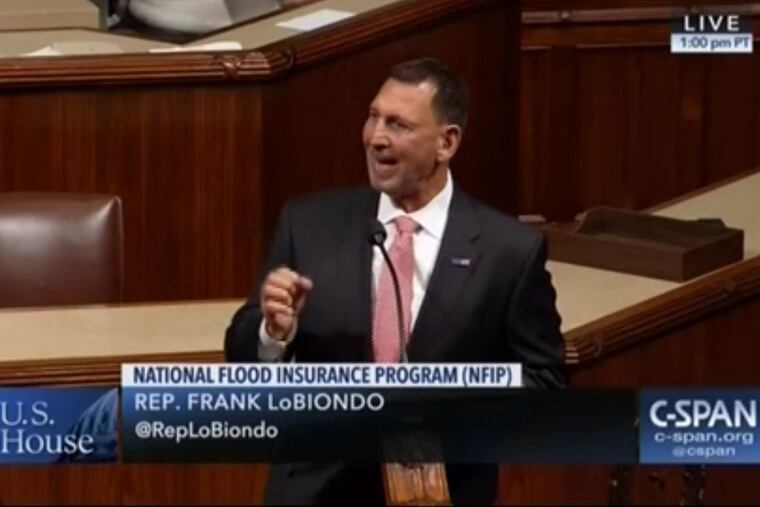Flood insurance revamp backed by GOP angers LoBiondo, other N.J. congressmen
Hurricane Katrina, Sandy and other subsequent storms and hurricanes have continued to plunge the widely-used National Flood Insurance Program billions into debt, which Republicans say they need to address. The new legislation, which still has yet to be taken up Senate, is really a sweeping package of bills that calls for, among a list of items, an increase in annual limits on premiums, with some properties experiencing multiple loses facing hikes of 15 percent a year.

Republican U.S. Rep. Frank LoBiondo and other New Jersey congressmen have lashed out against a House bill that would revamp the National Flood Insurance Program, which cover some 236,000 Garden State homeowners.
The program has been under fire because it is deeply in debt, discounts premiums for too many people, continues insuring properties that flood repeatedly, and forces residents in low-risk areas to subsidize flood-prone communities.
Moreover, many New Jersey residents who had coverage during Hurricane Sandy are still fighting for payouts to rebuild their lost homes five years later.
A GOP-led bill in the House to reauthorize the program for five years passed 237-189 on Tuesday mostly along partisan lines though some crossed over. The Senate has its own plan, so the fate the House bill remains unclear. The House bill includes many items, such as provisions that would increase annual limits on premiums by more than 6.5 percent over three years for certain homeowners.
"But now we have a situation that makes me angry — angry because we are picking winners and losers, angry because the misery index for some members is more important than the misery index in my district or the Northeast," said LoBiondo on the floor before voting against the bill.
LoBiondo, who has announced he will not seek reelection this year, represents the Second District, which includes beach communities from Atlantic City to Cape May, as well as the Delaware Bayshore.
Specifically, LoBiondo said he wants premium raises capped at $5,000 annually. He also wants a way for commercial properties to opt out of mandatory coverage and to reduce sanctions against communities with repetitively flooded areas.
Democratic Congressmen Frank Pallone and Bill Pascrell issued a statement saying the bill would "make flood insurance less affordable by forcing homeowners to pay higher insurance premiums."
One provision would raise the minimum annual increase on properties considered "grandfathered," meaning they were built before the Federal Emergency Management Agency (FEMA) created flood maps. FEMA administers the flood insurance program and homeowners' premiums are based on where their properties are located within the flood maps. But a continued criticism of the program is its failure to update the maps.
Pallone and Pascrell say they object to the price hikes that could hit owners of older homes that aren't in wealthy beach communities.
Reduced premiums have long been a sore point for detractors of the flood-insurance program. Some previous recommendations call for all discounted premiums to be scrapped.
Opponents say the bill also doesn't address how to handle the huge debt the program carries. Even before this year's trio of devastating hurricanes, the program was $24.7 billion in the red.
The flood insurance program has allowed New Jersey coastal communities to remain viable in the face of increasing floods and storms, which scientists link to climate change. In New Jersey, 235,970 homeowners and businesses pay premiums for $58 billion in insured value. Of all the state's communities, Ocean City is most dependent on the program with $4 billion of insured value.
Republican congressmen Chris Smith and Rodney Frelinghuysen also voted against the bill. But their GOP colleague Tom MacArthur voted in favor of the package. His district spans from Burlington County into Ocean County and includes communities such as Toms River that were devastated by Sandy. He is on the financial services committee which crafted the bill.
The bill "is certainly not flawless," he said in a statement that touted the fact that it prohibits FEMA from hiring disbarred attorneys, a problem that plagued some of the claims process.
Elsewhere, the New Jersey Organizing Project, a Shore advocacy group founded after Sandy, also lashed out against the bill. Joe Mangino, a co-founder of the group, said it does not fund updated flood maps while making it tougher for policyholders to take a dispute to court. Yet, he said, it rewards private insurance companies, which administer the policies while taking none of the risk.
Note: The wording was changed in this article to note that Ocean City has $4 billion of insured value under the flood insurance program – not in premiums as originally stated.